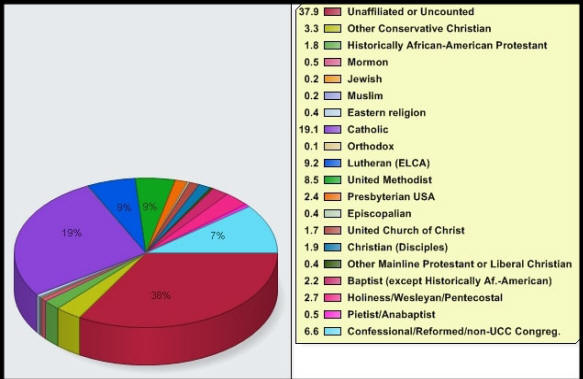|
Links:
Spiritual Politics blog
State by State
Leonard E. Greenberg Center
Contributors
State by
state
|
IOWA
Polls
Democratic caucus entrance poll
Republican caucus entrance poll
Iowa: Religious
demographics chart

Democratic
Caucus Results
|
|
940
|
38%
|
16
|
|
|
744
|
30%
|
14
|
|
|
737
|
29%
|
15
|
|
|
53
|
2%
|
0
|
|
|
23
|
1%
|
0
|
|
Uncommitted
|
3
|
0%
|
0
|
|
|
1
|
0%
|
0
|
|
|
0
|
0%
|
0
|
|
|
0
|
0%
|
0
|
Republican Caucus Results
|
|
|
40,841
|
34%
|
17
|
|
|
29,949
|
25%
|
12
|
|
|
15,904
|
13%
|
0
|
|
|
15,559
|
13%
|
3
|
|
|
11,817
|
10%
|
2
|
|
|
4,097
|
4%
|
0
|
|
|
524
|
1%
|
0
|
Commentary
1 20 08
The more things change...
Mark Silk
A certain
amount has been made--including in this blog--about the differences among
evangelicals from one part of the country to another, and between Iowa and
South Carolina in particular. It's worth noting, then, that performance of
evangelicals in those states, most importantly with respect to their
candidate, was all but identical. White evangelicals constituted the same
portion of the primary vote (better than half), and just about the same
portion of them voted for Huckabee (in the mid-40 percent range). What this
suggests is that the differences--for example, between more charismatic
types in Iowa and more Southern Baptist types in South Carolina--just don't
matter that much anymore when it comes to politics. Back in 1988, when Pat
Robertson (charismatic) got clobbered in SC, they did. Check out the
details, for
Iowa and
South Carolina.
by Mark Silk
1
Huckabee and the born again vote
In a previous post, Mark noted Huckabee’s similar performance among born again voters in Iowa (46 percent) and South Carolina (43 percent) and wondered if the religious differences among evangelicals haven’t been overstated. This is a good point: Evangelicals may be more alike than different in the context of a Republican
primaryBut a look at all the contests to date suggests a more nuanced
picture. Huckabee did get about the same proportion of the born-again vote
in the Iowa caucuses and the South Carolina primary, but his margin was much
larger in Iowa (27 percentage points over Romney) than in South Carolina (16
percentage points over McCain). In the New Hampshire primary, Huckabee and
McCain tied among born-again voters (28 percent each), while Romney
outpolled Huckabee among them in the Michigan primary (34 to 29 percent) and
in the Nevada caucuses (39 to 22 percent).
Surely lots of factors influenced these results, but it is quite plausible
that the kinds of evangelicals in these states mattered as well. Put another
way, Huckabee may have a special access and appeal to certain kinds of
evangelicals and does best where they are thickest on the ground. In the
nomination contests, access may be more important than appeal. Due to the
penurious state of his campaign, Huckabee has had to rely on grassroots
networks among evangelicals and these networks may not reach all kinds of
evangelicals equally well. The more diverse the evangelicals in a state, the
harder they are to reach.
What about us?
Mark Silk
Yesterday, leaders of the possibly growing left wing
of American evangelicalism issued
a protest letter to the big media outlets complaining about the fact
that, in the Iowa "entrance" poll and the NH exit poll, only participants on
the Republican side were asked if they would describe themselves "as a born
again or evangelical Christian." Why the polls did that is not a mystery, of
course. The evangelical vote is a big factor on the GOP side--and after all,
in recent general elections two-third to three-quarters of evangelicals have
voted Republican. Still, there's been a lot of talk about the possibility
that white evangelicals are going to start looking more closely at
Democratic candidates, and one way to gauge that would be to see the extent
to which they are voting in Democratic primaries. (Of course, it will be
important to include the cross-tab for race, since most black churchgoers
also consider themselves born again.) So, to the polling gurus, a hearty
second from this blog. To be sure, the news may not turn out to be so good
for the evangelical left--but we'll presume that those guys are big enough
to deal with something other than Good News.
|

